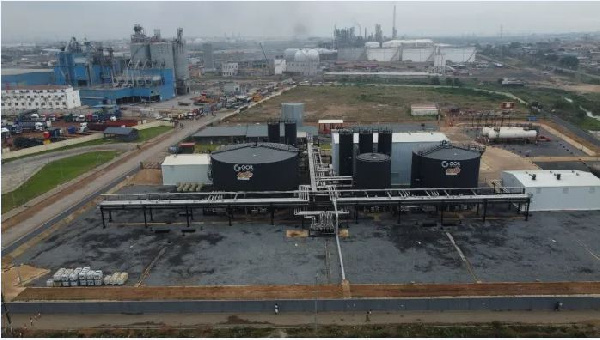Ghana is on course to reduce the $11.8 billion average annual bitumen import bill with commercial production of polymer modified bitumen (PMB) in the country.
Petroleum downstream and midstream player,GOIL, set up the bitumen production plant in Tema as a strategic move to venture into new areas and to help the country reduce the foreign exchange it spends to import the product from neighbouring Cote d’Ivoire and Brazil in South America.
With Ghana’s estimated 192,000 tonnes a year demand for bitumen, GOIL believes its 240 tonnes per day bitumen capacity
or more than 87,000 tonnes per year, will help to bridge the gap significantly.
The Managing Director and Group Chief Executive Officer (CEO) of GOIL, Kwame Osei Prempeh has told Graphic Online’s Della Russel Ocloo that the production of PMB was a major intervention to significantly lower the cost of road construction in Ghana.
Ghana further hopes to export the product to other markets across West Africa to generate foreign exchange.
The new venture is a major investment expected to positively impact the Ghanaian economy and reduce the country’s reliance on imported bitumen, generate foreign exchange and create jobs.
PMB is a type of bitumen combined with one or more polymer materials and used on road pavements, particularly those that are intended to withstand heavy-duty traffic and extreme weather conditions.
The $45 million facility has so far produced and marketed a combined 7,000 tonnes of bitumen emulsions and PMB since June this year.
Facility
The plant also has a 7,500 tonne storage facility built in partnership with Société Multinationale de Bitumes (SMB) of Côte d’Ivoire.
It has a three-kilometre pipeline connecting the plant to the oil jetty at the Tema Port to receive the base bitumen from supply vessels.
The fully automated plant also has internal pipelines installed above the ground, as opposed to the normal feature of petroleum and other pipelines connecting the oil jetty being laid on the ground.
The facility has two storage tanks with a capacity of 2,000 metric tons for AC 10 bitumen and 4,000 metric tons for AC20 which are the base raw materials for processing into the emulsion and the PMB.
Benefits
Mr Osei-Prempeh said the company’s association with SMB was key in accessing the base raw material, which would have been difficult to get from outside West Africa.
“Our expectations are that our activities will cut down, with a long-term view of stopping the importation of the essential component used for asphalting,” he said.
“The product would also be exported in the long term to generate foreign exchange for the country,” he added.
The project, Mr Osei-Prempeh pointed out, aligned with the company’s overall strategy of diversifying its business from an oil marketing company to the mines, ocean bunkering and other areas.
Import
Ghana imported an average of $11.8 billion of bitumen from Cote d’Ivoire and Brazil for road projects in 2021.
It is estimated that bitumen demand on an annual basis stands at 192,000 tonnes.
Whereas the sale of the products since the commencement of operations have been low, Mr Osei-Prempeh said that was due to the cash-and-carry system the company had in place to ensure the sustainability of the business.
He emphasised that while sustainability was key to GOIL, the company hoped to ensure that the product quality was maintained.
“Although low patronage has been a key challenge facing the company, we will continue to network within the infrastructure industry to ensure a future viability of the sector expanding further into creating opportunities for people,” he said.
That notwithstanding, Mr Osei-Prempeh said GOIL also intended to use the facility to build technical capacity among players as a way of ensuring the growth of the industry in the foreseeable future.
He expressed the hope that local contractors would turn to patronise the products instead of engaging in importation which could put stress on the local currency and take jobs away from the population.
Maintenance
The Director of Technical Services of GOIL, Alphonso Okai Jr, said the company had a stringent quality control measure aimed at ensuring that the products met the required quality and standards.
He also highlighted the preventive maintenance plan that had been put in place to ensure that the plant was maintained properly.
The plant, Mr Okai said, used the latest technology, including transducers that measured products being loaded at the facility.
“Safety is a top priority for GOIL, and the company has plans in place to ensure that no fatal injuries occur,” Mr Okai said.
“For this reason, we have instituted a safety regime where overall operations are reviewed daily and near incidents evaluated to improve safety processes,” he added.





